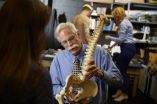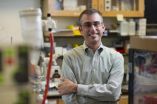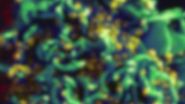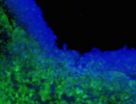(Press-News.org) Six Case Western Reserve scientists are part of an international team that has discovered two compounds that show promise in decreasing inflammation associated with diseases such as ulcerative colitis, arthritis and multiple sclerosis. The compounds, dubbed OD36 and OD38, specifically appear to curtail inflammation-triggering signals from RIPK2 (serine/threonine/tyrosine kinase 2). RIPK2 is an enzyme that activates high-energy molecules to prompt the immune system to respond with inflammation. The findings of this research appear in the Journal of Biological Chemistry.
"This is the first published indication that blocking RIPK2 might be efficacious in inflammatory disease," said senior author Derek Abbott, MD, PhD, associate professor of pathology, Case Western Reserve University School of Medicine. "Our data provides a strong rationale for further development and optimization of RIPK2-targeted pharmaceuticals and diagnostics."
In addition to Abbott and his medical school colleagues, the research team included representatives of Oncodesign, a therapeutic molecule biotechnology company in Dijon, France; Janssen Research & Development, a New Jersey-based pharmaceutical company; and Asclepia Outsourcing Solutions, a Belgium-based medicinal chemistry company.
The normal function of RIPK2 is to send warning signals to cells that bacterial infection has occurred, which in turn spurs the body to mobilize white blood cells. The white blood cells identify and encircle pathogens, which cause blood to accumulate in the region. It is this blood build-up that leads to the red and swollen areas characteristic of inflammation. When this process goes awry, the inflammation increases dramatically and tissue destruction ensues. RIPK2 works in conjunction with NOD1 and NOD2 (nucleotide-binding oligomerization domain) proteins in controlling responses by the immune system that lead to this inflammation process.
In this research project, investigators applied state-of-the-art genetic sequencing to learn the unique set of genes driven specifically by NOD2 proteins. They ultimately zeroed in on three specific NOD2-driven inflammation genes (SLC26a, MARCKSL1, and RASGRP1) that guided investigators in finding the most effective compounds.
Oncodesign searched its library of 4,000 compounds that targeted kinases, and after exhaustive study, narrowed the selection down to 13. Then investigators tested the 13 compounds in mouse and human cells and found that two compounds, OD36 and OD38, were most effective in blocking RIPK2.
"Based on the design of OD36 and OD38, we have developed with Oncodesign fifth-generation compounds that are even more effective than the first-generation OD36 and OD38," Abbott said. "Our next step is to seek a larger pharmaceutical company that can move these compounds forward into Phase 1 clinical trials in humans."
INFORMATION:
Collaborating with Abbott from Case Western Reserve were Fabio Cominelli, MD, PhD, professor of medicine, School of Medicine, and division chief, gastroenterology, University Hospitals Case Medical Center, and Theresa T. Pizarro, professor of pathology, School of Medicine. Additional researchers involved in the study included Justine T. Tigno-Aranjuez, PhD, and Benedetta Mattioli, both of the Department of Pathology, Case Western Reserve; XiaoDong Bai, PhD, RNA Center, Case Western Reserve; Pascal Benderitter and Jan Hoflack, PhD, both of Oncodesign; Frederick Rombouts, Janssen Research & Development; and Frederik Deroose, PhD, Asclepia Outsourcing Solutions.
This work was supported by the National Institutes of Health (R01 GM086550 and P01 DK091222); an American Cancer Society Postdoctoral Fellowship Award PF-1 1-058-01-MPC; and a Burroughs Wellcome Career Award. Benderitter, Hoflack and Abbott have financial interests in the development of novel RIP2 inhibitors.
About Case Western Reserve University School of Medicine
Founded in 1843, Case Western Reserve University School of Medicine is the largest medical research institution in Ohio and is among the nation's top medical schools for research funding from the National Institutes of Health. The School of Medicine is recognized throughout the international medical community for outstanding achievements in teaching. The School's innovative and pioneering Western Reserve2 curriculum interweaves four themes--research and scholarship, clinical mastery, leadership, and civic professionalism--to prepare students for the practice of evidence-based medicine in the rapidly changing health care environment of the 21st century. Nine Nobel Laureates have been affiliated with the School of Medicine.
Annually, the School of Medicine trains more than 800 MD and MD/PhD students and ranks in the top 25 among U.S. research-oriented medical schools as designated by U.S. News & World Report's "Guide to Graduate Education."
The School of Medicine's primary affiliate is University Hospitals Case Medical Center and is additionally affiliated with MetroHealth Medical Center, the Louis Stokes Cleveland Department of Veterans Affairs Medical Center, and the Cleveland Clinic, with which it established the Cleveland Clinic Lerner College of Medicine of Case Western Reserve University in 2002. http://casemed.case.edu
Newly published findings from the University of Waterloo are giving women with bad backs renewed hope for better sex lives. The findings—part of the first-ever study to document how the spine moves during sex—outline which sex positions are best for women suffering from different types of low-back pain. The new recommendations follow on the heels of comparable guidelines for men released last month.
Published in European Spine Journal, the female findings debunk the popular belief that spooning—where couples lie on their sides curled in the same direction—is ...
Down syndrome is the most common chromosomal abnormality in humans, involving a third copy of all or part of chromosome 21. In addition to intellectual disability, individuals with Down syndrome have a high risk of congenital heart defects. However, not all people with Down syndrome have them – about half have structurally normal hearts.
Geneticists have been learning about the causes of congenital heart defects by studying people with Down syndrome. The high risk for congenital heart defects in this group provides a tool to identify changes in genes, both on and ...
In early drug discovery, you need a starting point, says Northeastern University associate professor of chemistry and chemical biology Michael Pollastri.
In a new research paper published Thursday in the journal PLOS Neglected Tropical Diseases, Pollastri and his colleagues present hundreds of such starting points for potentially treating African sleeping sickness, a deadly disease that claims thousands of lives annually.
Pollastri, who runs Northeastern's Laboratory for Neglected Disease Drug Discovery, ...
WASHINGTON – October 24, 2014 – Policy options for climate change risk management are straightforward and have well understood strengths and weaknesses, according to a new study by the American Meteorological Society (AMS) Policy Program.
"Large gaps remain in society's consideration of climate policy," said Paul Higgins, the author of the study. "This study can help in the development of a comprehensive strategy for climate change risk management because it explores a much larger set of policy options."
The study identifies four categories of climate ...
Washington, D.C., October 24, 2014 -- Only 6 percent of U.S. hospitals are well-prepared to receive a patient with the Ebola virus, according to a survey of infection prevention experts at U.S. hospitals conducted October 10-15 by the Association for Professionals in Infection Control and Epidemiology (APIC).
The survey asked APIC's infection preventionist members, "How prepared is your facility to receive a patient with the Ebola virus?" Of the 1,039 U.S.-based respondents working in acute care hospitals, about 6 percent reported their facility was well-prepared, while ...
LAWRENCE – 'Call your mother' may be the familiar refrain, but research from the University of Kansas shows that being able to text, email and Facebook dad may be just as important for young adults.
Jennifer Schon, a doctoral student in communication studies, found that adult children's relationship satisfaction with their parents is modestly influenced by the number of communication tools, such as cell phones, email, social networking sites, they use to communicate.
Schon had 367 adults between the ages of 18 and 29 fill out a survey on what methods of communications ...
VIDEO:
The Jones lab details a new target to fighting HIV.
Click here for more information.
LA JOLLA—Like a slumbering dragon, HIV can lay dormant in a person's cells for years, evading medical treatments only to wake up and strike at a later time, quickly replicating itself and destroying the immune system.
Scientists at the Salk Institute have uncovered a new protein that participates in active HIV replication, as detailed in the latest issue of Genes & Development. ...
Spectacular eruptions at Bárðarbunga volcano in central Iceland have been spewing lava continuously since Aug. 31. Massive amounts of erupting lava are connected to the destruction of supercontinents and dramatic changes in climate and ecosystems.
New research from UC Davis and Aarhus University in Denmark shows that high mantle temperatures miles beneath the Earth's surface are essential for generating such large amounts of magma. In fact, the scientists found that the Bárðarbunga volcano lies directly above the hottest portion of the North Atlantic ...
Harvard Stem Cell Institute scientists at Massachusetts General Hospital have devised a new way to use stem cells in the fight against brain cancer. A team led by neuroscientist Khalid Shah, MS, PhD, who recently demonstrated the value of stem cells loaded with cancer-killing herpes viruses, now has a way to genetically engineer stem cells so that they can produce and secrete tumor-killing toxins.
In the AlphaMed Press journal STEM CELLS, Shah's team shows how the toxin-secreting stem cells can be used to eradicate cancer cells remaining in mouse brains after their main ...
A new study has found that implementing stricter fisheries management overcame the expected detrimental effects of climate change disturbances in coral reef fisheries badly impacted by the 1997/98 El Niño, according to the Wildlife Conservation Society.
The 17-year study led by WCS fisheries scientists found that rapid implementation of fisheries restrictions countered adverse climate effects and actually increased fisheries catches, counter to predictions and findings in other studies without stricter management. This is good news for the millions of people who ...




